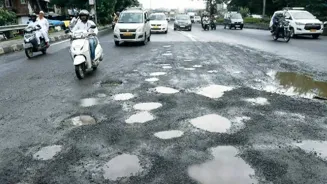The Public Accounts Committee (PAC) of Parliament has raised serious concerns over newly built concrete roads collapsing in rain-prone and low-lying areas.
A recent report blames design flaws, weak quality
checks, and an over-reliance on contractors for these premature failures.
The PAC criticised the “indiscriminate shift” from bituminous to concrete roads without proper technical and environmental assessments.
While concrete roads were expected to last longer with minimal upkeep, several have shown cracks, surface damage, and structural weaknesses soon after completion, as per TOI.
What Went Wrong on the Ground?
Examples cited include damage on the Delhi–Vadodara Expressway and the Kooriyad road collapse in Kerala. Roads expected to last decades have shown cracks, surface distress, and concrete failures within a short period after completion.
The Kerala incident, the PAC noted, stemmed from inaccurate soil studies and weak oversight from both the builder and the supervising consultant.
Who Is Really Accountable?
According to the committee, project preparation, execution, and even supervision have largely been left to contractors and consultants, with the National Highways Authority of India (NHAI) limiting itself to formal approvals.
This hands-off approach, they warned, dilutes accountability — especially when supervisors fail to flag design issues.
The report stressed that approved designs must be strictly implemented and no cost-cutting shortcuts by concessionaires or subcontractors should be tolerated.
Another major issue raised was the unchecked subcontracting of work. Many primary contractors outsource to multiple layers of subcontractors, making it hard to enforce quality standards or meet deadlines.
The PAC has recommended allowing only one level of subcontracting, with any further outsourcing requiring special approval from NHAI.
What’s Next?
The committee has called for a mandatory, evidence-based framework for choosing road materials and designs, ensuring they are tailored to local conditions. It has also urged tighter monitoring and stronger accountability measures.













